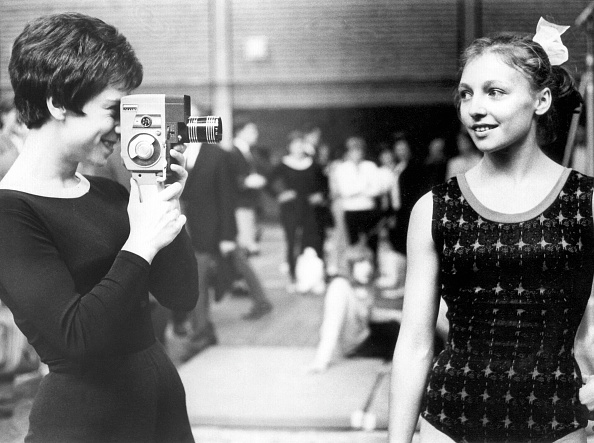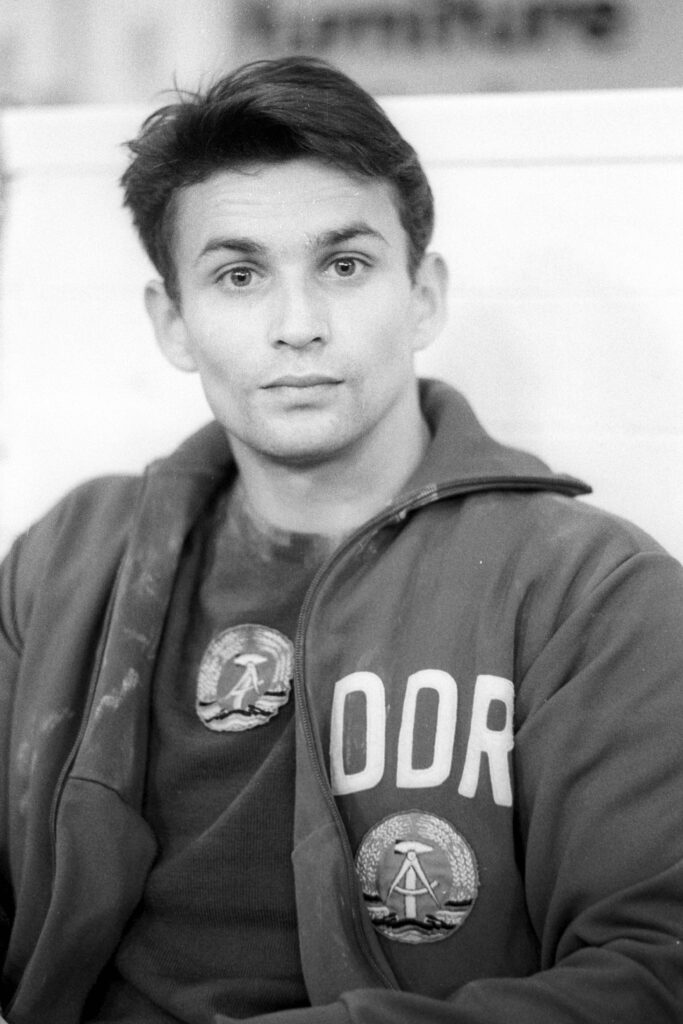The Latvian newspaper Sports did interviews with Natalia Kuchinskaya and Klaus Köste at the 1974 edition of the Riga International. At the time, Kuchinskaya, one of the stars of the 1966 World Championships and 1968 Olympic Games, was working in Ukraine as a choreographer. Klaus Köste, the 1972 Olympic champion on vault, had retired from the sport and then came back.
Below, you can find translations of their interviews. You can find a report on the 1974 competition in Riga here.

Natalia Kuchinskaya
— Riga spectators, if we could say so, have not had the opportunity to observe your skill in person. Therefore, it would be intriguing to learn: What did you value the most in this international competition?
— Here, I was able to learn a lot of valuable things for my work. I am a choreographer for the gymnastics department of the Kyiv Higher School of Sports Mastery. Most of my work is focused on the Ukrainian national team’s members. Although sometimes you have to help create routines for very young athletes.
And here, watching the competition, I get the most valuable excitement. I can see the most cutting-edge gymnastics tendencies right now, which are supposed to be the “skills of the future.”
— Which routines did you like the most in the women’s competition, and how do you rate the start of Ilona Jarane from Riga?
— The people of Riga are very lucky because they can watch very young and very promising girls in these competitions. This can especially be said about the members of the Soviet team. Lidia Gorbik and Nellie Kim’s floor exercises were very expressive, and Kim’s uneven bars routine was dynamic and full of complex elements. Galina Parshintseva’s salto between the two uneven bars was also effective.
In my opinion, Ilona Jarane did her most successful exercise on beam. Her routine was interesting, but the girl, of course, still lacks extensive competition experience.
— What style of exercise do you like the most?
— The romantic. An excellent example here is Elvira Saadi. Of course, the exercise also requires complex tumbling, interesting connections. But I still like it best when they are all done emotionally.
Sports, Latvjijas PSR Sporta biedribu izdevums, Nr. 49, March 28, 1974
Natāliju Kučinsku
— Rīgas skatītājiem, ja tā varētu teikt, klātienē nav bijusi iespēja vērot jūsu meistarību. Tādēļ tagad būtu interesanti uzzināt, kas šajās starptautiskajās sacensībās jums likās visvērtīgākais?
— Pie jums varēju gūt daudz ko vērtīgu tieši savam darbam. Esmu Kijevas Augstākās sporta meistarības skolas vingrošanas nodaļas horeogrāfe. Mans darbs lielākoties saistīts ar Ukrainas izlases dalībniekiem. Lai gan ari kādreiz jāpalīdz izveidot kompozīcijas pavisam jauniņiem sportistiem.
Un, lūk, vērojot sacensības, es gūstu visvērtīgāko ierosmi. Te es redzu, kādi pašlaik ir vingrošanas progresīvākie no-virzieni, kuri būs tā saucamie nākotnes elementi.
— Kuras kompozīcijas jums visvairāk patika sieviešu sacensībās, un kā jūs vērtējat rīdzinieces Ilonas Jārānes startu?
— Rīdziniekiem ļoti laimējies, jo viņi šajās sacensībās var vērot pavisam jaunas un ļoti perspektīvas meitenes. It īpaši to var teikt par padomju komandas dalībniecēm. Ļoti izteiksmīga bija Lidija Gorbika un Nellija Kima brīvajās kustībās, dinamiska un sarežģītiem elementiem bagāta bija Kimas kompozīcija līdztekās. Efektīgs bija arī Gaļinas Paršincevas salto starp abām līdztekas kārtīm.
Ilona Jārāne, manuprāt, visveiksmīgāk vingroja uz baļķa. Viņas kompozīcija ir interesanta, tikai meitenei vēl, protams, trūkst plašu sacensību pieredzes.
— Kāds vingrošanas stils jums ir vissimpātiskākais?
— Romantiskais. Te lielisks piemērs ir Elvīra Šādi. Protams, vingrojumā nepieciešami arī sarežģīti lēcieni, interesanti kustību savienojumi. Bet man tomēr vislabāk patīk, ja tie visi tiek izpildīti emocionāli.

— Since 1971, I have competed in every international gymnastics event held in Riga. The fact that this type of competition is held in the spring, when there is not any respectable competition, is, in my opinion, its greatest asset. The athlete can then completely assess his or her readiness for the forthcoming season and experiment by combining a variety of intricate skills. Although it is challenging to demonstrate something novel or unexpected at my age beyond the threshold of thirty years I am also preparing for the world championships an element that I myself have not seen in competition for a long time. Which one? I won’t reveal it yet.
— However, we read in the press in the fall of last year that you had quit gymnastics …
— That’s really how it was. As everyone knows, there will be a world championship this year. Although the best man on our team, Wolfgang Thüne, has already won a prize among the strongest gymnasts in the world, as it turns out, I am still needed by my team. That’s why I decided to say goodbye to gymnastics in the fall.
— Will you work as a coach in the future?
— Even though I’m learning the knowledge needed to coach athletes, I’ll never work as a coach. I will work in a job related to sports. It may sound strange, but I want to finally get out of the gym. I am tired.
— But you started enthusiastically, didn’t you?
— My parents forced me to go to the gym as they were gymnasts starting when I was six years old. And I had to learn about this sport regardless if I wanted it or not. Only after mastering a really challenging skill did I realize that this was the only place where I would be able to truly master my skills.
— Is gymnastics popular in your country?
— To be honest, not really. For example, there is one sports school in my hometown — Frankfurt am Oder — where you can practice gymnastics. But compared to the Soviet Union, our prospects of choosing athletes are tremendously lower.
— What do you think is the difference between Soviet and Japanese gymnastics schools?
— The Japanese athletes perform their routines cleanly, with each movement being meticulously polished, but the Soviet athletes engage in more passionate activity. I don’t perceive any notable differences between the gymnastics programs in these two nations. However, Japanese men have taken home the majority of the medals in both the Olympic Games and the World Championships. There is a simple explanation for this in my opinion. While Soviet coaches advocate early specialization, Japanese coaches strive to physically develop a child from his or her earliest steps into athletics and only then turn him or her to a certain discipline.
– What competitions do you have the most pleasant memories of?
The Munich Olympics were an unforgettable event in my life. Never even in my dreams did I see myself in the honor of the champion. It was difficult to accept that I had won the vault competition against every top gymnast in the world. And the most touching moment was when Nikolai Andrianov, Viktor Klimenko, and Yuri Titov congratulated me. They said: “Your gold medal is very precious to us. It feels like a representative of our team won it.”
— Will we ever meet you again in Riga?
— I have fallen in love with your city and I use any opportunity to get here again. I used every free moment to wander around Old Riga and also … to go to an antique shop. I am very interested in ancient books. And more. If Moscow is chosen to host the 1980 Olympic Games, I will undoubtedly visit your country as a tourist.
– Thanks for the conversation.
This conversation was recorded.
M. Upite
Sports, Latvjijas PSR Sporta biedribu izdevums, Nr. 49, March 28, 1974
Olimpisko čempionu VDR sportistu Klausu Kesti
— Esmu piedalījies visās starptautiskajās vingrošanas sacensībās, kas notikušas Rīgā, jau no 1971. gada. Manuprāt, visvērtīgākais ir tas, ka šāds turnīrs tiek rīkots pavasarī, kad vēl nav bijušas nevienas atbildīgas sacensības. Tad sportists pilnībā var pārbaudīt savu gatavību gaidāmajai sezonai, var eksperimentēt, kombinācijās iekļaujot daudzus sarežģītus elementus. Lai gan manā vecumā, aiz trīsdesmit gadu sliekšņa, kaut ko jaunu, pārsteidzošu grūti parādīt, tomēr arī es pasaules meistarsacīkstēm gatavoju kādu elementu, ko pats sacensībās sen neesmu redzējis. Kādu? To gan pagaidām neatklāšu.
— Bet pērnā g3da rudenī presē lasījām ziņu, ka jūs esot aizgājis no vingrošanas paaugstinājuma …
— Tā tas tiešām arī bija. Kā jau visiem zināms, šogad būs pasaules meistarsacīkstes. Lai gan mūsu komandas labākais vīrs Volfgangs Tīne jau ir iekarojis vietu pasaules spēcīgāko vingrotāju vidū, tomēr, kā izrādās, arī es vēl esmu savai izlasei vajadzīgs. Tāpēc arī nolēmu — vingrošanai sveikas teikšu rudenī.
— Vai jūs turpmāk strādāsit par treneri?
— Lai gan pašlaik apgūstu zināšanas, kas nepieciešamas sportistu audzinātājam, tomēr treneris noteikti nebūšu. Strādāšu darbā, kas saistīts ar sportu. Varbūt tas skan dīvaini, bet es vēlos beidzot izkļūt no sporta zāles. Esmu noguris.
— Bet sākāt taču aizrautīgi?
— Tā kā mani vecāki bija vingrotāji, tad viņi mani jau no sešu gadu vecuma vilkšus vilka uz sporta zāli. Un gribot negribot man bija jāiepazīst šis sporta veids. Tikai tad, kad jau pratu izpildīt kedu diezgan sarežģītu elementu, beidzot sapratu, ka tikai te pa īstam varēšu atklāt savas spējas.
— Vai jūsu valstī vingrošana ir populāra?
— Godīgi sakot, ne visai. Piemēram, dzimtajā pilsētā — Frankfurtē pie Oderas — ir viena sporta skola, kurā var nodarbojies ar vingrošanu. Tomēr sportistu atlases iespējas mums ir nesalīdzināmi mazākas nekā Padomju Savienībā.
— Kāda, jūsuprāt, ir atšķirība starp padomju un japāņu vingrošanas skolām?
— Japāņi savas kompozīcijas izpilda eleganti, ikviena kustība ir noslīpēta līdz pilnībai, toties padomju sportisti vingro emocionālāk. Nekādu būtisku atšķirību starp šo divu valstu vingrošanas skolām es nesaskatu. Tomēr gan pasaules meistarsacīkstēs, gan olimpiskajās spēlēs Japānas vīri ieguvuši lielāko daļu medalu. Es to izskaidroju pavisam vienkārši. Japāņu treneri jau no
bērna pirmajiem soļiem sportā cenšas viņu fiziski vispusīgi attīstīt un tikai pēc tam to pievērst kādam konkrētam sporta veidam, bet padomju treneri priekšroku dod agrajai specializācijai.
– Par kādām sacensībām jums ir vispatīkamākās atmiņas?
Minhenes olimpiskās spēles ir neaizmirstams notikums manā dzīvē. Nekad pat sapņos sevi nebiju redzējis čempiona godā. Grūti bija ticēt, ka atbalsta lēcienā esmu pieveicis visus spēcīgākos pasaules vingrotājus. Un pats aizkustinošākais brīdis bija tad, kad mani apsveica Nikolajs Andrianovs, Viktors Kļimenko un Jurijs Titovs. Viņi teica: «Tava zelta medaļa mums ir ļoti dārga. Ir tāda sajūta, it kā to būtu ieguvis mūsu komandas pārstāvis.»
— Vai mēs jūs vēl kādreiz sastapsim Rīgā?
— Esmu ļoti iemīļojis jūsu pilsētu un izmantoju jebkuru iespēju vēlreiz te nokļūt. Izmantoju ikvienu brīvu brīdi, lai paklaiņotu pa Vecrīgu un arī … lai aizietu uz antikvariātu. Mani ļoti interesē senas grāmatās. Un vēl. Ja Maskavā notiks 1980. gada olimpiskās spēles, tad noteikti ieradīšos jūsu zemē kā tūrists.
— Paldies par sarunu.
Sarunu pierakstīja
M. Upīte
More on 1974